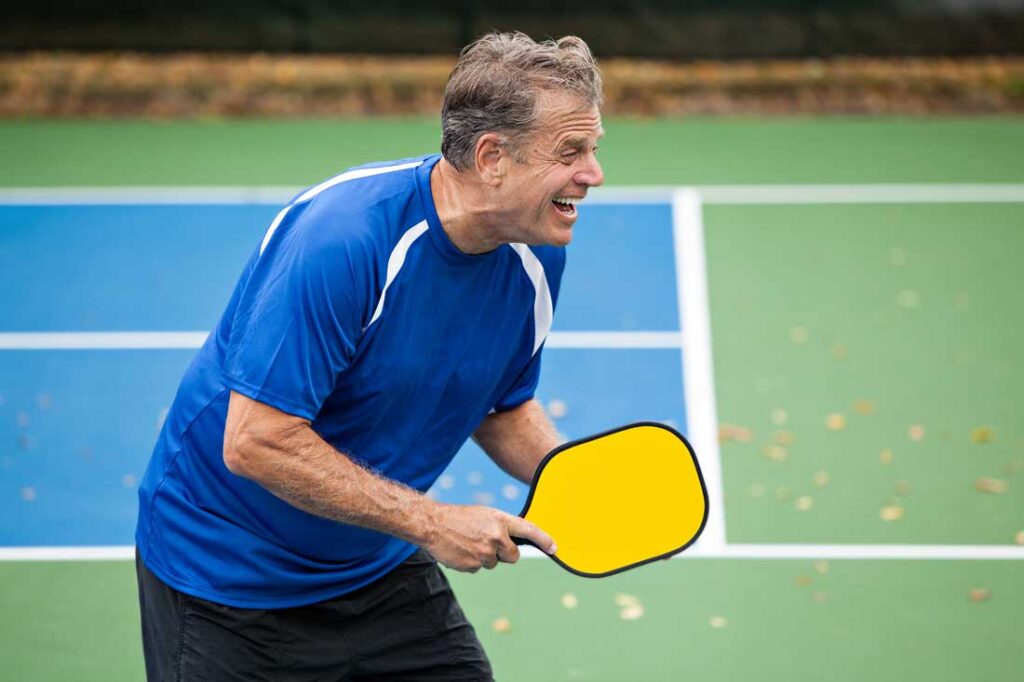Pro tip: Have friends who send you emails that go something like this: I represent the company putting on one of the biggest pickleball tournaments in the country. Would you like to fly out to Atlantic City, New Jersey, get taught to play by an all-time great and enter the tournament the next day?
Though I had never played, I of course said yes. I always say yes. In the past few years, I have tried surfing, rock climbing, ice climbing, a dozen other new-to-me activities and, now, pickleball. Early in my career, I decided against specializing in writing about one subject. Instead, I chase other people’s passions. I find people who love doing interesting things and ask them to teach me. I do it because it’s fun, because it suits my personality and because it allows me to live a well-rounded life.
I have found there is much more to it than even all that. Being a generalist is a good, albeit unconventional, career-development strategy, though I’d be lying if I said I did it because of that.
In today’s world, we’re bombarded from a young age to pick something to specialize in. We pick a major and then a career and then face admonitions to stay in our figurative lane. Firms and individuals alike are pressured to excel in narrow areas of expertise. The better you are at your niche, the more valuable your work—or so the thinking goes.
There is growing evidence that suggests that line of thinking is too reductive. All of us would benefit from understanding a wide range of areas and recognizing how things are interconnected and interdependent, so we can see the big picture when making decisions and bring multifaceted approaches when solving problems.
The path to becoming a generalist
It’s easy to become a specialist. You pick a lane and stay in it. Being a generalist isn’t so simple. How do you pursue that path when there really isn’t one?
One way is to work for a company that allows, encourages or embraces it. Constance Schwartz-Morini, the co-founder and CEO of SMAC Entertainment, is a perfect example.
Early in her career, she landed a job with the NFL. Over the years, she danced between “television programming, sponsorship, events, marketing and player engagement,” according to her SMAC Entertainment bio. She watched and learned, especially early on when she was an assistant. “The NFL was my MBA,” she says.
Schwartz-Morini didn’t set out to become a generalist—she half-jokingly says she wishes she could take credit for pursuing it. While she may not have done it on purpose, she says it seems inevitable in retrospect, because she has the characteristics necessary: She’s intensely curious, eager to learn and willing to ask for help.
It may have been accidental at first, but now she pursues a wide-ranging career very much on purpose. Her work at SMAC Entertainment shows she’s still deep in the generalist life. SMAC Entertainment is “a talent management firm, business incubator and Emmy-nominated production company,” according to Schwartz-Morini’s bio. As a manager, Schwartz-Morini represents athletes and entertainers. As a producer, she works on scripted media, unscripted media and even game shows. As an entrepreneur, she has helped launch clothing lines.
That wide-ranging approach has nurtured her already deep passion for being well-rounded. Now, she tries to create fellow generalists. She manages athletes and entertainers with an explicit eye on multifaceted careers. She won’t represent anyone who wants to stay just what they are—i.e., a specialist.
Her three most famous clients—Deion Sanders, Michael Strahan and Erin Andrews—started out in niche markets. Each was initially well known within that niche and less so in the wider world. Now, all three are household names. They came from different fields and emerged out of their lanes in different ways, because no generalist follows a rote pattern. “The only thing they have in common is me,” Schwartz-Morini says.
Generalists are comfortable seeking outside help
One of the problems with being a specialist is that it lulls you into a false sense of security. You think because you know so much about your field, you can solve whatever problems arise. And you are right—until you are completely wrong.
In his book Range: How Generalists Triumph in a Specialized World, David Epstein writes that if you are struggling with a narrow problem in a niche field, somebody who knows nothing about that field might be better at solving the problem than you are. That’s because the more we know about something (“the inside view”), the poorer our decisions are about it, especially when it comes to problem-solving. “In a wicked world, relying upon experience from a single domain is not only limiting, it can be disastrous,” Epstein writes.
A company called Wazoku created Wazoku Crowd, which gives clients access to crowdsourced problem-solving. A company with a problem pays Wazoku to ask for solutions from its community of solvers, and whoever comes up with the best one gets a reward.
A generalist doesn’t arrive at the top feeling like they need to know everything. They arrive at the top in part because they have been comfortable in new roles in which they didn’t know anything. Schwartz-Morini says she’s good when she knows what she’s doing and even better when she doesn’t, because she is so comfortable seeking outside help.
Gaining ‘the outside view’
What we know puts us in a box that contains only solutions we could reasonably devise from the contents of that box. The answer might be in a different box: “the outside view.” The more boxes we have access to, the better off we’ll be. “The outside view probes for deep structural similarities to the current problem in different ones,” Epstein writes.
The key phrase there for me is “deep structural similarities.” Just about every time I acquire a new skill, I learn something that applies to the rest of my life. In surfing, I learned valuable lessons about how I learn. From an ATV guide, I learned about authenticity. In ice climbing, I learned valuable lessons about trust.
In pickleball, I learned about covering a lot of ground… or tried to, at least. Going into the tournament, I feared that the very skill I am honing and advocating—increasing my range—would be my weakness in pickleball.
I figured I would lose because I wouldn’t be able to reach shots. But that wasn’t the case. Don’t get me wrong. I lost all four matches I played in the 2022 Dietz & Watson Atlantic City Pickleball Open. But the problem wasn’t that I couldn’t get to balls hit far from me. The problem was balls hit right at me. I couldn’t move my paddle fast enough to return those.
This article originally appeared in the May/June 2023 issue of SUCCESS magazine. Photo by Ahturner/Shutterstock.










